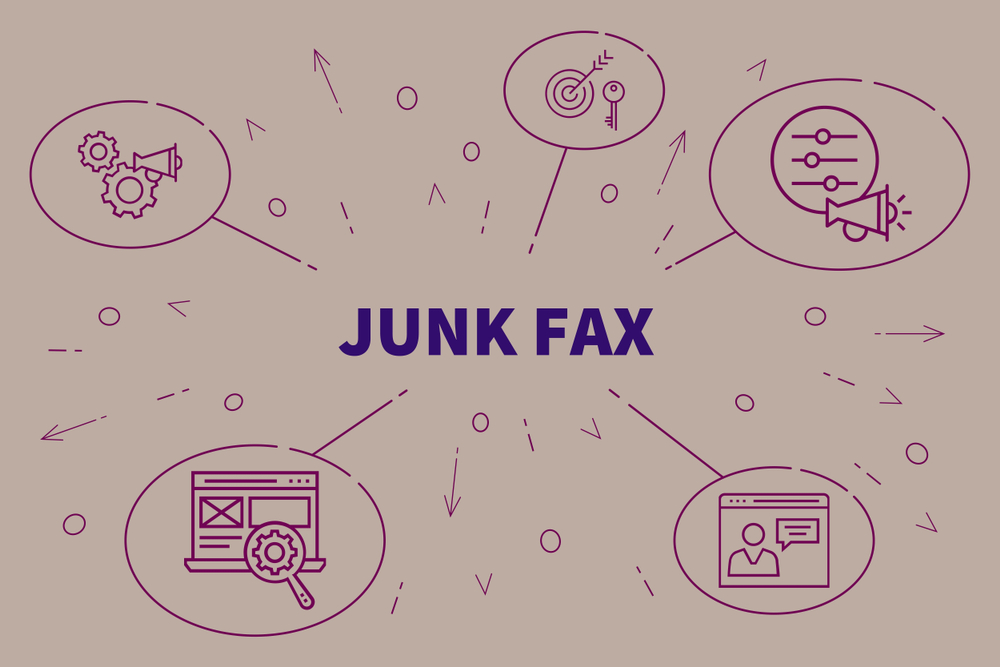Small and Medium-Sized Business
Fax Advertising Laws: What Every Business Should Know to Stay Compliant
Compare All PlansStart Faxing Now
Fax advertising might seem like an old-school tactic, but it remains a valuable component of a well-rounded omnichannel marketing strategy, complementing email and Short Message Service (SMS) campaigns. However, understanding and adhering to fax advertising laws is crucial to keeping your efforts just as compliant as they are cost-effective.
After all, these regulations do more than just protect your business from fines — they foster trust with your audience.
From the original Telephone Consumer Protection Act to the 2005 Junk Fax Prevention Act, the long-standing rules of fax marketing demand careful attention. Fortunately, solutions like eFax Corporate simplify regulatory compliance while still delivering impactful marketing messages. Let’s explore the key fax advertising laws every business should know.
Understanding Fax Advertising
Before we break down the nuances of fax advertising laws in the United States, it’s helpful to understand the basics of fax marketing. This practice involves sending promotional messages — such as brochures, coupons or flyers — to targeted recipients via fax. For example, medical practices might receive special offers for new supplies, or send messages about discounted treatment plans.
Fax advertising first emerged in the 1980s, when fax machines became integral to workplaces worldwide. Businesses took advantage of this technology to send promotional materials directly to customers. While traditional fax advertising focuses on physical machines, modern fax marketing now uses digital fax technology to enable companies to send targeted campaigns at scale.
However, it’s important to note that fax marketing isn’t limited to direct promotions. Messages that offer free goods or services, even if related to a transaction, qualify as advertisements. Likewise, satisfaction or similar consumer surveys that lead to promotional content are subject to the same fax advertising regulations as direct promotions, emphasizing the importance of compliance.
Is Fax Advertising Still Effective?
Despite the surge of marketing channels like pay-per-click (PPC) advertisements, email campaigns and SMS marketing messages, fax advertisements are far from obsolete. In fact, fax messages remain a thriving method for reaching target audiences around the world, specifically for businesses in private markets and industries.
According to the Global Fax Services Market: Outlook & Forecast 2024-2029 report, the fax market is expected to scale at a compound annual growth rate (CAGR) of 11.08% over the coming years. This growth will see the market increase from $3.46 billion in 2024 to $6.5 billion in 2029, signaling that fax campaigns are still going strong.
Fax advertising is especially valuable in countries like Japan and Germany, where faxing continues to be a key communication tool. It also remains essential for organizations in highly regulated industries — such as healthcare, finances, insurance and legal sectors — that depend on faxing for handling sensitive and confidential information.
What continues to make fax advertising effective is its highly targeted nature. Campaigns can be tailored to business size, location and industry, fostering direct and personalized connections with recipients. When fax marketing law requirements are upheld, it’s also a more budget-friendly alternative to maintain maximum impact.
Key Laws Governing Fax Advertising
Fax advertising laws in the United States fall under the jurisdiction of the Consumer Policy Division of the Federal Communications Commission (FCC). Two primary regulations govern how organizations can send promotional materials to consumer fax machines: the Telephone Consumer Protection Act (TCPA) and the Junk Fax Prevention Act.
TCPA Compliance Requirements
TCPA, formally known as 47 U.S.C. § 227, restricts the use of any fax machine, computer, or other device to send unsolicited advertisements to business and residential numbers. In this context, “unsolicited” refers to promotional or informational messages that are delivered without the recipient’s explicit permission. Under TCPA, permission is only granted when the recipient agrees to an Established Business Relationship (EBR) and willingly provides their phone or fax number.
Junk Fax Prevention Act
The Junk Fax Prevention Act was drafted in 2005 as an amendment to the original TCPA fax marketing law. It updated the law so that organizations could send unsolicited fax advertisements to individuals and businesses with whom they have an EBR and have already voluntarily obtained a fax number from, even if the recipient did not explicitly request marketing materials.
As a primary component of fax advertising laws, the Junk Fax Prevention Act also mandates clear opt-out notices for recipients, complete with a procedure to stop sending ads upon recipients’ request. Similar to email marketing opt-out notices, fax advertising must include clear instructions for how to stop receiving promotional material that recipients consider fax spam messages.
How to Stay Compliant with Fax Advertising Laws?
Understanding fax advertising laws in the United States is just the first step in staying compliant. To avoid legal pitfalls for your business, you must also adhere to the regulations for fax marketing that govern consent, opt-outs and recipient relationships. Here are five proven strategies to do just that:
1. Create Established Business Relationships
An Established Business Relationship is formed through voluntary interactions, such as inquiries, purchases or applications related to your products or services. Under the rules of fax marketing, you can safely deliver fax advertisements to recipients with whom you have an EBR. However, the EBR must be directly with you, the sender, and cannot be applied to your affiliates.
2. Acquire Fax Numbers Voluntarily
The Consumer Policy Division mandates that advertisers must obtain fax numbers voluntarily within the context of an EBR. Examples of voluntary sharing include as part of an application, contact information form or membership renewal form. Numbers listed in public directories, on letterheads or on recipient websites are also considered voluntary unless explicitly stated otherwise.
Per the rules of fax marketing, if numbers are sourced from third parties — including business associates — you must verify recipient consent. Notably, fax numbers acquired before July 9, 2005, through an EBR are not subject to proof of acquisition nor recipient consent.
3. Obtain Explicit Permission from Recipients
There are certain instances in which you can send unsolicited advertisements without an EBR and still remain compliant with fax advertising laws. To do so requires prior permission from recipients. This type of consent is typically granted through contact forms, which explicitly indicate that recipients who provide a fax number also permit fax advertising messages.
According to the FCC, senders must maintain proof of permission, including completed contact forms, applications, inquiries, purchase agreements and sales slips to remain compliant.
4. Offer Clear Opt-Out Notifications
Under regulations for fax marketing, both solicited and unsolicited fax advertisements must include a prominent opt-out notice on the first page that is clearly separated from the advertising material. This notice must provide recipients with accessible methods to opt-out, such as a toll-free number, email address or website. Advertisement opt-out systems must be available 24/7.
Additionally, all faxes — whether solicited or unsolicited — must feature sender identification, including the transmission date and time, your company’s registered name and a contact number. These measures help to keep all fax communication transparent and secure.
5. Honor Opt-Out Requests Promptly
You must honor opt-out requests within 30 days of receipt. These requests remain valid indefinitely unless recipients explicitly provide new permission to receive fax advertisements. Compliance with fax advertising laws also requires your opt-out systems to operate around the clock.
Moreover, you must take full responsibility for processing requests, even if handled by third-party services like toll-free number providers. Ensuring timely responses to opt-out requests, no matter how they are handled, maintains both consumer trust and regulatory compliance.
Legal Consequences of Non-Compliance with Fax Marketing Laws
Failure to comply with fax advertising laws can lead to significant penalties. Recipients of unsolicited faxes have the right to file consumer complaints directly with the FCC, triggering investigations into non-compliant businesses. Beyond legal repercussions, ignoring regulations for fax marketing can tarnish your organization’s reputation and erode customer trust.
Non-compliance typically results in fines ranging from $500 to $1,500 per unsolicited fax, depending on the willfulness or purposeful intent of the violation. Additionally, recipients can sue violators to recover actual monetary losses or statutory damages, whichever is higher. Class action lawsuits are especially common, amplifying the financial impact on non-compliant businesses.
For example, the Dallas Cowboys settled a $1.73 million class action lawsuit in 1999 over willful and repeated violations of TCPA. More recently, the FCC issued a $1.84 million forfeiture against Scott Malcolm, of DSM Supply, LLC and Somaticare, LLC — medical equipment suppliers — for similar infractions, demonstrating that the law is still actively enforced, even decades later.
Run Legally Compliant Fax Advertising Campaigns with eFax Corporate
Navigating fax advertising laws can be daunting, but eFax Corporate simplifies the process. As an enterprise-grade cloud faxing solution, eFax empowers businesses across industries to run legally compliant fax marketing campaigns while streamlining workflows and maintaining data security.
Take a look at five ways eFax Corporate helps maintain fax advertising efforts that are both effective and compliant.
Streamline Regulatory Compliance
eFax Corporate empowers businesses by keeping fax campaigns compliant with laws like the TCPA and the Junk Fax Prevention Act. Additionally, eFax supports adherence to broader privacy regulations — such as the California Consumer Privacy Act (CCPA, the Health Insurance Portability and Accountability Act (HIPAA) and the European Union’s General Data Protection Regulation (GDPR) — making it ideal for industries that handle sensitive or regulated information.
Integrate with Existing Workflows
Fax marketing works best when it complements other channels. eFax Corporate integrates seamlessly with tools like email providers, social media platforms, collaboration apps and cloud storage solutions, helping businesses maintain cohesive marketing campaigns. This unrivaled interoperability enables smoother operations and enhanced productivity for omnichannel marketing campaigns.
Trust in Reliable, 24/7 Server Uptime
When adhering to the rules of fax marketing, consistent availability is vital. eFax Corporate offers reliable, 24/7 server uptime through a robust cloud-based infrastructure, allowing users to send and receive faxes anytime, anywhere. This round-the-clock reliability means opt-out requests are addressed promptly to maintain compliance and guarantee minimal disruption to marketing activities.
Leverage Unlimited Cloud Storage
With fax advertising laws requiring businesses to maintain proof of consent, eFax Corporate’s unlimited cloud storage is invaluable. All sent and received faxes are securely stored in the cloud, providing easy access for auditing and reporting. This feature allows businesses to track fax history, compile usage reports and retrieve critical documents, so there’s always a digital paper trail for compliance.
Maintain Secure Fax Marketing
eFax Corporate prioritizes security by employing advanced encryption protocols, including AES 256-bit and Transport Layer Security (TLS) encryption. These measures certify that all sent and received faxes remain confidential and protected from unauthorized access by malicious actors. By safeguarding sensitive data, eFax helps businesses comply with fax advertising laws and maintain consumer trust.
FAQs Around Fax Advertising Laws
Fax advertising laws in the United States require businesses to obtain explicit prior consent or an Established Business Relationship (EBR) before sending promotional faxes. Faxes must also include clear opt-out notices and sender identification and comply with the Telephone Consumer Protection Act (TCPA) and the Junk Fax Prevention Act.
The Junk Fax Prevention Act is a key fax marketing law that prohibits sending unsolicited promotional messages without prior consent or an EBR. It also mandates opt-out mechanisms on all fax advertisements, allowing recipients to easily cease future communications. Violations can result in costly penalties and lawsuits, plus consumer distrust.
Yes, the TCPA does apply to faxes. It’s part of the broader regulations for fax marketing that govern the sending of unsolicited advertisements, requiring prior consent and an EBR.
To comply with fax advertising laws, businesses must acquire fax numbers voluntarily through forms, letterheads or websites. Numbers sourced from directories or ads are presumed voluntary unless explicitly stated otherwise. Consent must be verifiable if obtained from third parties.
An Established Business Relationship (EBR) is a pre-existing relationship based on voluntary interaction like applications, inquiries or purchases. Under fax advertising laws in the United States, an EBR allows businesses to send faxes without prior consent, provided recipients can opt-out at any time and the relationship is directly with the sender, not affiliates.















